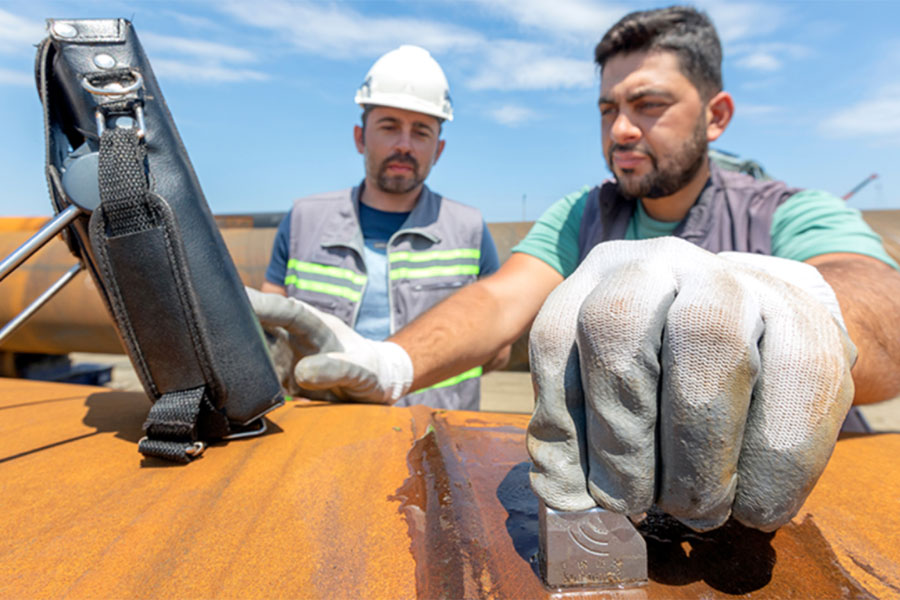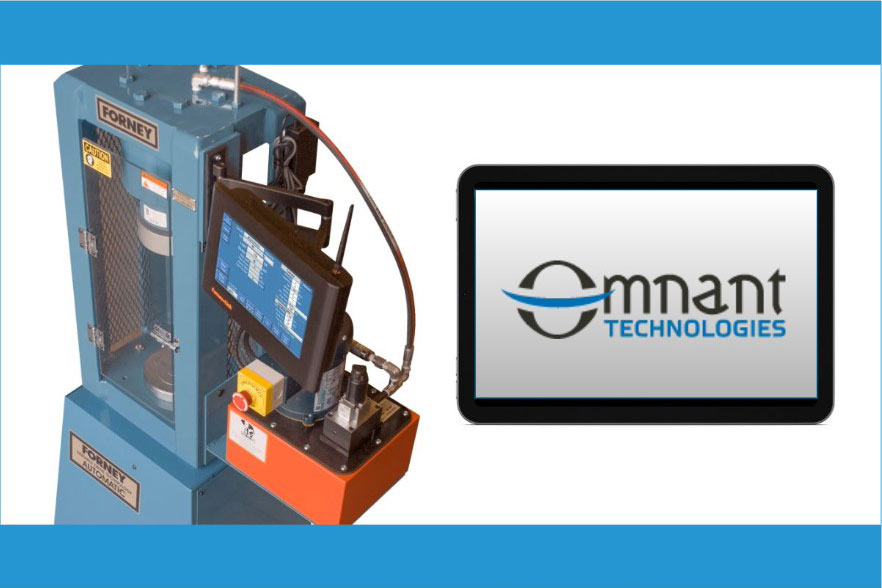Construction Materials Testing 101: Where Engineering Meets Excellence
Construction materials testing is integral for ensuring the safety, durability, and quality of every building project. From residential foundations to major infrastructure projects, material testing provides the critical data needed to verify that construction materials meet specified standards and performance requirements. In this blog, we’ll cover everything you need to know about construction materials testing, from basic procedures to industry standards.
What is Construction Materials Testing?
Construction materials testing is the systematic evaluation of building materials to determine their physical, mechanical, and chemical properties. This material testing process demoastrates that concrete, steel, soil, aggregate, and other construction materials meet industry standards and project specifications before and during construction.
In addition to establishing structural safety and longevity, the primary goal of construction materials testing is to verify material quality and compliance with specifications. This process helps prevent costly construction failures, meets regulatory requirements, and provides key documentation for quality assurance programs.
Types of Construction Materials Testing
Concrete Testing
Concrete testing represents one of the most critical aspects of construction materials testing. Compressive strength testing determines concrete's ability to withstand loads and stresses, typically performed on cylindrical samples after specific curing periods.
Slump testing measures concrete workability and consistency during placement, and air content testing evaluates freeze-thaw resistance in concrete mixtures. These material testing procedures ensure concrete meets project specifications and performs reliably throughout the structure's lifespan.
Soil & Geotechnical Testing
Soil testing provides crucial information about ground conditions and load-bearing capacity for foundation design.
The Standard Penetration Test (SPT) measures soil density and consistency at various depths. Proctor compaction testing determines optimal moisture content for proper soil compaction. California Bearing Ratio (CBR) testing evaluates soil strength for pavement and foundation design. These testing materials for construction help engineers design appropriate foundations and earthwork specifications.
Aggregate & Materials Testing
Aggregate testing ensures that sand, gravel, and crushed stone meet quality standards for concrete and asphalt production. Gradation analysis determines particle size distribution, which affects concrete strength and workability. The Los Angeles Abrasion Test measures aggregate resistance to wear and degradation, and soundness testing evaluates aggregate durability against weathering. These material testing procedures are fundamental to producing durable concrete and asphalt mixtures.
Steel & Structural Materials Testing
Material testing for steel and metals verifies strength, ductility, and weldability properties that are fundamental for structural applications. Tensile strength testing measures steel's resistance to breaking under tension, and hardness testing evaluates wear resistance and material properties.
Chemical analysis verifies steel composition and grade compliance with project specifications. These construction materials testing procedures ensure structural elements meet safety and performance requirements
Industry Standards & Testing Procedures
Construction materials testing follows established industry standards to ensure consistency and reliability across projects. Major testing standards include:
- ASTM International: Complete material testing standards covering concrete, soil, and aggregate testing
- AASHTO Standards: Transportation and highway materials specifications
- ACI Standards: Concrete testing and construction practice guidelines
- AISC Standards: Structural steel testing and fabrication requirements
The standard testing process begins with proper sample collection, gathering representative material samples according to specifications. Sample preparation involves conditioning materials under controlled environments before testing. Test execution follows standardized procedures to ensure accurate and repeatable results. Data analysis compares results to project specifications and industry standards, followed by reporting that documents findings and recommendations.
Quality control programs integrate construction materials testing throughout the construction process. Pre-construction material approval checks that materials meet specifications before delivery. Ongoing construction monitoring includes field testing to verify proper installation and performance. Post-construction documentation provides records for warranty and maintenance purposes.
Modern Testing Technology & Equipment
Today's construction materials testing relies on sophisticated equipment for accurate and reliable results. Universal testing machines perform compressive and tensile strength testing with precise load application and measurement. Digital data collection systems automate test procedures and eliminate manual recording errors. Environmental chambers provide controlled curing conditions for concrete samples and other materials requiring specific temperature and humidity conditions.
Field testing capabilities enable real-time quality control during construction activities. Nuclear density gauges measure soil and asphalt density without requiring sample extraction. Rebound hammers provide non-destructive concrete strength evaluation for existing structures. Core drilling equipment extracts samples from completed construction for verification testing. Learn more about construction materials testing equipment and how modern tools improve testing accuracy.
Laboratory Information Management Systems (LIMS) have revolutionized how testing laboratories manage data and workflows. These systems track samples from collection through final reporting for ensuring proper chain of custody and eliminating data management errors. Real-time result access allows immediate decision-making during construction activities.
Why Construction Material Testing is Critical
Safety represents the primary driver for end-to-end construction materials testing programs. Material testing prevents structural failures by verifying that materials can withstand expected loads and environmental conditions. This testing provides compliance with building codes and safety regulations. It also identifies potential material defects before they become problems.
Construction materials testing delivers considerable benefits across multiple areas:
- Cost Management: Prevents expensive rework and material replacement through early defect detection
- Risk Reduction: Minimizes warranty claims and liability exposure for contractors and owners
- Regulatory Compliance: Satisfies building codes, permits, and certification requirements
- Quality Assurance: Maintains consistent standards throughout the construction process
Regulatory compliance requires systematic documentation of material quality and testing results. Building permits often specify testing requirements that must be satisfied before construction approval. LEED and other sustainability certifications may require specific material testing and documentation. Insurance and legal protection depends on thorough testing records that demonstrate due diligence in quality control.
Selecting the Right Testing Laboratory
Choosing an appropriate testing laboratory significantly impacts project success and quality outcomes. Laboratory accreditation through AASHTO, ASTM, or ISO provides assurance of testing competency and quality management systems. The range of available tests and specialized equipment determines whether a laboratory can handle all project requirements efficiently.
When evaluating testing laboratories, consider these factors:
- Accreditation Status: AASHTO, ASTM, or ISO certification for quality assurance
- Testing Capabilities: Range of available tests and specialized equipment
- Turnaround Times: Ability to meet project schedule requirements
- Geographic Coverage: Laboratory locations and field testing availability
- Technology Integration: Digital reporting and project management system compatibility
Technology capabilities increasingly differentiate testing laboratories in competitive markets. Online result access and automated notification systems keep project teams informed of testing progress and results. Integration with project management systems automates documentation and approval processes. Mobile applications enable field personnel to request testing services and access results from job sites.
Experience with similar project types and materials provides valuable insights beyond basic testing services. Laboratories familiar with local regulations and requirements can help navigate compliance challenges. For laboratories seeking to improve their operations, CMT software for modern laboratories can optimize efficiency and service quality. Technical consultation services help resolve material issues and optimize specifications for improved performance and cost-effectiveness.
Construction Materials Testing Best Practices
Successful testing programs begin with thorough planning that establishes clear testing requirements and acceptance criteria. Coordination between testing laboratories, contractors, and project owners ensures everyone understands roles and responsibilities. Regular communication prevents misunderstandings and addresses issues promptly before they impact project schedules.
Sample collection procedures require careful attention to ensure representative materials and proper handling. Chain of custody documentation protects sample integrity and provides legal protection. Proper sample storage and transportation prevent contamination or damage that could affect test results.
For projects requiring specialized field inspection software, mobile applications can simplify data collection and improve coordination between field and laboratory teams. This integration creates an uninterrupted workflow from sample collection through final reporting.
Documentation management becomes increasingly important as projects grow in size and complexity. Digital systems that integrate testing results with project management platforms accelerate approval processes and reduce administrative overhead. Chain of custody software ensures proper sample tracking and legal compliance. Centralized record keeping supports warranty claims, legal protection, and future maintenance planning.
The Future of Materials Testing
Emerging technologies continue to transform construction materials testing with improved efficiency and new capabilities. Non-destructive testing methods enable evaluation of existing structures without causing damage. Real-time monitoring systems provide continuous assessment of material performance during construction and service life.
Sustainability considerations drive development of testing procedures for recycled and alternative materials. Environmental impact assessment becomes increasingly important as the construction industry focuses on reducing carbon footprints and resource consumption. Life cycle analysis integration with traditional testing provides more accurate material evaluation.
Digital integration connects materials testing with broader construction technology ecosystems. Building Information Modeling (BIM) integration enables testing data to inform design decisions and construction planning. Predictive analytics use historical testing data to optimize material selection and construction procedures.
Building Quality Through Comprehensive Materials Testing
Construction materials testing forms the foundation of quality construction by validating that materials meet specifications and performance requirements. From concrete compressive strength to soil bearing capacity, thorough material testing protects investments and offers long-term structural performance.
Modern testing combines proven traditional methods with advanced technology to deliver faster, more accurate results. Whether managing small residential projects or major infrastructure developments, robust construction materials testing programs are essential for project success.
Working with qualified testing laboratories and implementing systematic quality control procedures helps construction professionals achieve the highest quality and safety standards. It also controls costs and minimizes risks. For testing laboratories looking to improve their operations, integrated construction materials testing software can improve workflows and service delivery for better project outcomes.
Whether you're a testing laboratory looking to streamline workflows or a construction professional seeking reliable testing partners, the right tools and expertise make all the difference.
Schedule a consultation today and learn how integrated construction materials testing software can transform your testing processes, improve accuracy, and deliver better project outcomes.
Share this Post:
Related Blog Post
Start streamlining your inspection and CMT testing processes with Omnant's integrated solution. Contact us today to learn how our software can support your goals for operational excellence.


